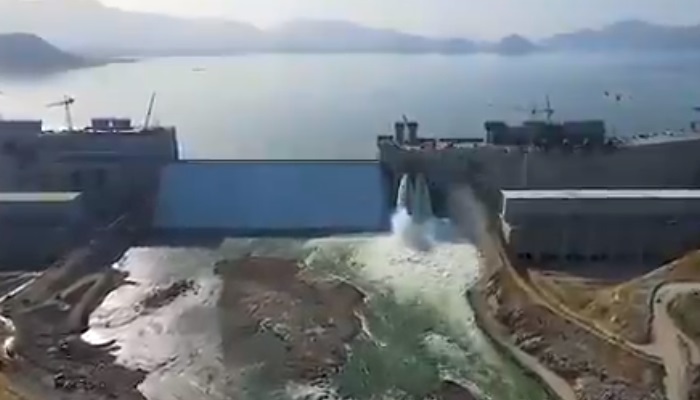Ambassador Hussein Haridi, a former assistant to the Egyptian Foreign Minister, confirmed that the ball is now in the stadium of the African Union and its president, as there are only a few weeks left for the flood season in the Blue Nile and the second filling of the Renaissance Dam.
In his speech to Al-Jazeera Mubasher, Haridi added, "The African Union must act urgently, and I do not see a contradiction between work in the African framework and the international framework, and what Egypt wants is that Ethiopia does not take any unilateral measures that harm the two downstream countries."
And he added, "With regard to the Ethiopian declarations on African sovereignty and its rejection of international mediation, it indicates that it has no intention so far to reach an agreement that governs the rules for filling and operating the dam."
Between Sudan's call for negotiations on the Renaissance Dam and the abstention of Ethiopia ... What is the position of # Egypt?
# Evening # Egypt # Tunisia # Sudan # Ethiopia # Renaissance Dam pic.twitter.com/cE3YcluaF2
- Al Jazeera Mubasher (@ajmubasher) April 22, 2021
He continued, "Egypt has done a lot in the many rounds of negotiations, and the Egyptian delegation presented several scenarios to facilitate the approach to an agreement on the dam, and has been negotiating for ten years and signed in good faith the Declaration of Principles agreement in 2015."
Regarding the options that Egypt may pursue to ensure that its water rights are not harmed, Haridi said that Egypt is committed to the approach of negotiation for the peaceful settlement of disputes between countries, and therefore it wants to solve the problem peacefully.
Regarding the feasibility of the Egyptian Foreign Minister’s recent African tour, while Ethiopia is taking steps on the ground to prepare for the second filling, he said, “Egypt does not want any international mobilization against any of the countries, but it has the right to explain its position and what happened in the Kinshasa negotiations.”
Ambassador Hussein Haridi: # Egypt is committed to the approach of negotiation and the principle of resolving disputes by peaceful means. # Evening # Ethiopia # Sudan # Renaissance Dam pic.twitter.com/2saxcxxg6W
- Al Jazeera Mubasher (@ajmubasher) April 22, 2021
On the other hand, international law expert Abdel-Majid Al-Abdali believes that such steps by Egypt are of no use because the Renaissance Dam file is confined to the two downstream countries and Ethiopia, and it would have been better for Egypt to seriously negotiate with Ethiopia.
He added to Al-Jazeera Mubasher, “International law does not prevent Ethiopia from building the dam, but it should not harm the two downstream countries, Egypt and Sudan, and Ethiopia says that the dam is subject to Ethiopian sovereignty and does not harm downstream countries. Therefore, it must be proven whether the amount that reached Egypt and Sudan in the past was 55.5 billion. One cubic meter and 18 billion cubic meters annually - will decrease or not, and these are technical operations. ”
He continued, "Egypt, during the era of President Donald Trump, resorted to the United States, then to the Security Council, and then to other countries not concerned, and I do not imagine that this resort will benefit, and the three countries must negotiate directly to find a solution and conclude an agreement."
An Egyptian tour to a number of countries # Africa regarding the Renaissance Dam crisis .. What is its impact? # Evening # Tunisia # Egypt # Sudan # Ethiopia pic.twitter.com/RemS6onbDe
- Al Jazeera Mubasher (@ajmubasher) April 22, 2021
Egyptian Foreign Minister Sameh Shoukry went to Tunisia yesterday on the last leg of his African tour, and Tunisian President Qais Said delivered a message from President Abdel Fattah El-Sisi regarding the Renaissance Dam.
The Ethiopian Minister of Irrigation, Celchi Bikli, also announced yesterday that the lower exits of the Renaissance Dam have begun work with a total capacity of 1,860 cubic meters per second, stressing that the completion of the bottom outlets guarantees the continued flow of water to the downstream countries.
Dam engineering expert Abu Bakr Muhammad al-Mustafa commented by saying that the Ethiopian minister's speech relates to a phased part about the release of the summer flows of the Blue Nile, and this includes the minimum flow and is different from the flood season.
What did the Ethiopian Minister of Irrigation mean about completing the two lower ports of the Renaissance Dam?
# Evening # Egypt # Sudan # Ethiopia pic.twitter.com/mDlPsOd1HF
- Al Jazeera Mubasher (@ajmubasher) April 22, 2021
The expert added to Al-Jazeera Mubasher that the experience of the first filling of the dam showed how Sudan was directly affected, indicating that the dispute is technical and not legal, and it relates to how to exchange information, consensus and knowledge of operational programs to achieve the interests of the three countries, which will only be done through peaceful discussion.
The Sudanese Minister of Irrigation and Water Resources, Yasser Abbas, discussed with the Chargé d'Affairs of the US Embassy in Khartoum the latest developments in the negotiations that paid off the renaissance and the obstacles that stand in the way of resuming them.
Abbas warned of wasting time without reaching a legal agreement on the dam, in light of Ethiopia's adherence to the initiation of the second unilateral filling in July, which poses a threat to the safety of citizens and water facilities.
Continuous Egyptian and Sudanese efforts to solve the Renaissance Dam crisis, and Ethiopian interaction via # Twitter regarding negotiations pic.twitter.com/mzqjMdtiXn
- Al Jazeera Mubasher (@ajmubasher) April 22, 2021

